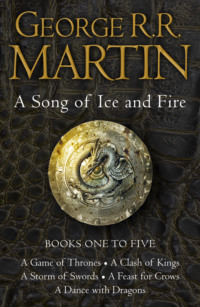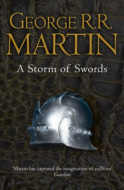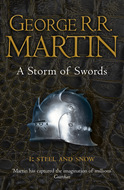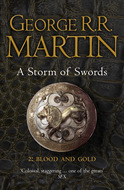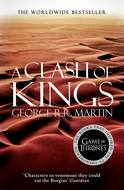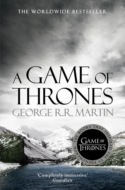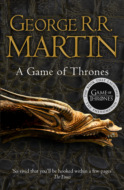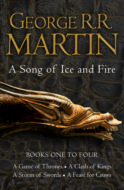Kitap dosya olarak indirilemez ancak uygulamamız üzerinden veya online olarak web sitemizden okunabilir.
Kitabı oku: «A Game of Thrones: The Story Continues Books 1-5», sayfa 75
This raindrop will one day be a king, old man. Theon had suffered quite enough of his uncle’s gloom. He put his spurs into his horse and trotted on ahead, smiling.
It was nigh on sunset when they reached the walls of Pyke, a crescent of dark stone that ran from cliff to cliff, with the gatehouse in the center and three square towers to either side. Theon could still make out the scars left by the stones of Robert Baratheon’s catapults. A new south tower had risen from the ruins of the old, its stone a paler shade of grey, and as yet unmarred by patches of lichen. That was where Robert had made his breach, swarming in over the rubble and corpses with his warhammer in hand and Ned Stark at his side. Theon had watched from the safety of the Sea Tower, and sometimes he still saw the torches in his dreams, and heard the dull thunder of the collapse.
The gates stood open to him, the rusted iron portcullis drawn up. The guards atop the battlements watched with strangers’ eyes as Theon Greyjoy came home at last.
Beyond the curtain wall were half a hundred acres of headland hard against the sky and the sea. The stables were here, and the kennels, and a scatter of other outbuildings. Sheep and swine huddled in their pens while the castle dogs ran free. To the south were the cliffs, and the wide stone bridge to the Great Keep. Theon could hear the crashing of waves as he swung down from his saddle. A stableman came to take his horse. A pair of gaunt children and some thralls stared at him with dull eyes, but there was no sign of his lord father, nor anyone else he recalled from boyhood. A bleak and bitter homecoming, he thought.
The priest had not dismounted. “Will you not stay the night and share our meat and mead, uncle?”
“Bring you, I was told. You are brought. Now I return to our god’s business.” Aeron Greyjoy turned his horse and rode slowly out beneath the muddy spikes of the portcullis.
A bentback old crone in a shapeless grey dress approached him warily. “M’lord, I am sent to show you to chambers.”
“By whose bidding?”
“Your lord father, m’lord.”
Theon pulled off his gloves. “So you do know who I am. Why is my father not here to greet me?”
“He awaits you in the Sea Tower, m’lord. When you are rested from your trip.”
And I thought Ned Stark cold. “And who are you?”
“Helya, who keeps this castle for your lord father.”
“Sylas was steward here. They called him Sourmouth.” Even now, Theon could recall the winey stench of the old man’s breath.
“Dead these five years, m’lord.”
“And what of Maester Qalen, where is he?”
“He sleeps in the sea. Wendamyr keeps the ravens now.”
It is as if I were a stranger here, Theon thought. Nothing has changed, and yet everything has changed. “Show me to my chambers, woman,” he commanded. Bowing stiffly, she led him across the headland to the bridge. That at least was as he remembered; the ancient stones slick with spray and spotted by lichen, the sea foaming under their feet like some great wild beast, the salt wind clutching at their clothes.
Whenever he’d imagined his homecoming, he had always pictured himself returning to the snug bedchamber in the Sea Tower where he’d slept as a child. Instead the old woman led him to the Bloody Keep. The halls here were larger and better furnished, if no less cold nor damp. Theon was given a suite of chilly rooms with ceilings so high that they were lost in gloom. He might have been more impressed if he had not known that these were the very chambers that had given the Bloody Keep its name. A thousand years before, the sons of the River King had been slaughtered here, hacked to bits in their beds so that pieces of their bodies might be sent back to their father on the mainland.
But Greyjoys were not murdered in Pyke except once in a great while by their brothers, and his brothers were both dead. It was not fear of ghosts that made him glance about with distaste. The wall hangings were green with mildew, the mattress musty-smelling and sagging, the rushes old and brittle. Years had come and gone since these chambers had last been opened. The damp went bone deep. “I’ll have a basin of hot water and a fire in this hearth,” he told the crone. “See that they light braziers in the other rooms to drive out some of the chill. And gods be good, get someone in here at once to change these rushes.”
“Yes, m’lord. As you command.” She fled.
After some time, they brought the hot water he had asked for. It was only tepid, and soon cold, and seawater in the bargain, but it served to wash the dust of the long ride from his face and hair and hands. While two thralls lit his braziers, Theon stripped off his travel-stained clothing and dressed to meet his father. He chose boots of supple black leather, soft lambswool breeches of silvery-grey, a black velvet doublet with the golden kraken of the Greyjoys embroidered on the breast. Around his throat he fastened a slender gold chain, around his waist a belt of bleached white leather. He hung a dirk at one hip and a longsword at the other, in scabbards striped black-and-gold. Drawing the dirk, he tested its edge with his thumb, pulled a whetstone from his belt pouch, and gave it a few licks. He prided himself on keeping his weapons sharp. “When I return, I shall expect a warm room and clean rushes,” he warned the thralls as he drew on a pair of black gloves, the silk decorated with a delicate scrollwork tracery in golden thread.
Theon returned to the Great Keep through a covered stone walkway, the echoes of his footsteps mingling with the ceaseless rumble of the sea below. To get to the Sea Tower on its crooked pillar, he had to cross three further bridges, each narrower than the one before. The last was made of rope and wood, and the wet salt wind made it sway underfoot like a living thing. Theon’s heart was in his mouth by the time he was halfway across. A long way below, the waves threw up tall plumes of spray as they crashed against the rock. As a boy, he used to run across this bridge, even in the black of night. Boys believe nothing can hurt them, his doubt whispered. Grown men know better.
The door was grey wood studded with iron, and Theon found it barred from the inside. He hammered on it with a fist, and cursed when a splinter snagged the fabric of his glove. The wood was damp and moldy, the iron studs rusted.
After a moment the door was opened from within by a guard in a black iron breastplate and pothelm. “You are the son?”
“Out of my way, or you’ll learn who I am.” The man stood aside. Theon climbed the twisting steps to the solar. He found his father seated beside a brazier, beneath a robe of musty sealskins that covered him foot to chin. At the sound of boots on stone, the Lord of the Iron Islands lifted his eyes to behold his last living son. He was smaller than Theon remembered him. And so gaunt. Balon Greyjoy had always been thin, but now he looked as though the gods had put him in a cauldron and boiled every spare ounce of flesh from his bones, until nothing remained but hair and skin. Bone thin and bone hard he was, with a face that might have been chipped from flint. His eyes were flinty too, black and sharp, but the years and the salt winds had turned his hair the grey of a winter sea, flecked with whitecaps. Unbound, it hung past the small of the back.
“Nine years, is it?” Lord Balon said at last.
“Ten,” Theon answered, pulling off his torn gloves.
“A boy they took,” his father said. “What are you now?”
“A man,” Theon answered. “Your blood and your heir.”
Lord Balon grunted. “We shall see.”
“You shall,” Theon promised.
“Ten years, you say. Stark had you as long as I. And now you come as his envoy.”
“Not his,” Theon said. “Lord Eddard is dead, beheaded by the Lannister queen.”
“They are both dead, Stark and that Robert who took broke my walls with his stones. I vowed I’d live to see them both in their graves, and I have.” He grimaced. “Yet the cold and the damp still make my joints ache, as when they were alive. So what does it serve?”
“It serves.” Theon moved closer. “I bring a letter—”
“Did Ned Stark dress you like that?” his father interrupted, squinting up from beneath his robe. “Was it his pleasure to garb you in velvets and silks and make you his own sweet daughter?”
Theon felt the blood rising to his face. “I am no man’s daughter. If you mislike my garb, I will change it.”
“You will.” Throwing off the furs, Lord Balon pushed himself to his feet. He was not so tall as Theon remembered. “That bauble around your neck—was it bought with gold or iron?”
Theon touched the gold chain. He had forgotten. It has been so long … In the Old Way, women might decorate themselves with ornaments bought with coin, but a warrior wore only the jewelry he took off the corpses of enemies slain by his own hand. Paying the iron price, it was called.
“You blush red as a maid, Theon. A question was asked. Is it the gold price you paid, or the iron?”
“The gold,” Theon admitted.
His father slid his fingers under the necklace and gave it a yank so hard it was like to take Theon’s head off, had the chain not snapped first. “My daughter has taken an axe for a lover,” Lord Balon said. “I will not have my son bedeck himself like a whore.” He dropped the broken chain onto the brazier, where it slid down among the coals. “It is as I feared. The green lands have made you soft, and the Starks have made you theirs.”
“You’re wrong. Ned Stark was my gaoler, but my blood is still salt and iron.”
Lord Balon turned away to warm his bony hands over the brazier. “Yet the Stark pup sends you to me like a well-trained raven, clutching his little message.”
“There is nothing small about the letter I bear,” Theon said, “and the offer he makes is one I suggested to him.”
“This wolf king heeds your counsel, does he?” The notion seemed to amuse Lord Balon.
“He heeds me, yes. I’ve hunted with him, trained with him, shared meat and mead with him, warred at his side. I have earned his trust. He looks on me as an older brother, he—”
“No.” His father jabbed a finger at his face. “Not here, not in Pyke, not in my hearing, you will not name him brother, this son of the man who put your true brothers to the sword. Or have you forgotten Rodrik and Maron, who were your own blood?”
“I forget nothing.” Ned Stark had killed neither of his brothers, in truth. Rodrik had been slain by Lord Jason Mallister at Seagard, Maron crushed in the collapse of the old south tower … but Stark would have done for them just as quick had the tide of battle chanced to sweep them together. “I remember my brothers very well,” Theon insisted. Chiefly, he remembered Rodrik’s drunken cuffs and Maron’s cruel japes and endless lies. “I remember when my father was a king, too.” He took out Robb’s letter and thrust it forward. “Here. Read it … Your Grace.”
Lord Balon broke the seal and unfolded the parchment. His black eyes flicked back and forth. “So the boy would give me a crown again,” he said, “and all I need do is destroy his enemies.” His thin lips twisted in a smile.
“By now, Robb is at the Golden Tooth,” Theon said. “Once it falls, he’ll be through the hills in a day. Lord Tywin’s host is at Harrenhal, cut off from the west. The Kingslayer is a captive at Riverrun. Only Ser Stafford Lannister and the raw green levies he’s been gathering remain to oppose Robb in the west. Ser Stafford will put himself between Robb’s army and Lannisport, which means the city will be undefended when we descend on it by sea. If the gods are with us, even Casterly Rock itself may fall before the Lannisters so much as realize that we are upon them.”
Lord Balon grunted. “Casterly Rock has never fallen.”
“Until now.” Theon smiled. And how sweet that will be.
His father did not return the smile. “So this is why Robb Stark sends you back to me, after so long? So you might win my consent to this plan of his?”
“It is my plan, not Robb’s,” Theon said proudly. Mine, as the victory will be mine, and in time the crown. “I will lead the attack myself, if it please you. As my reward I would ask that you grant me Casterly Rock for my own seat, once we have taken it from the Lannisters.” With the Rock, he could hold Lannisport and the golden lands of the west. It would mean wealth and power such as House Greyjoy had never known.
“You reward yourself handsomely for a notion and a few lines of scribbling.” His father read the letter again. “The pup says nothing about a reward. Only that you speak for him, and I am to listen, and give him my sails and swords, and in return he will give me a crown.” His flinty eyes lifted to meet his son’s. “He will give me a crown,” he repeated, his voice growing sharp.
“A poor choice of words, what is meant is—”
“What is meant is what is said. The boy will give me a crown. And what is given can be taken away.” Lord Balon tossed the letter onto the brazier, atop the necklace. The parchment curled, blackened, and took flame.
Theon was aghast. “Have you gone mad?”
His father laid a stinging backhand across his cheek. “Mind your tongue. You are not in Winterfell now, and I am not Robb the Boy, that you should speak to me so. I am the Greyjoy, Lord Reaper of Pyke, King of Salt and Rock, Son of the Sea Wind, and no man gives me a crown. I pay the iron price. I will take my crown, as Urron Redhand did five thousand years ago.”
Theon edged backwards, away from the sudden fury in his father’s tone. “Take it then,” he spat, his cheek still tingling. “Call yourself King of the Iron Islands, no one will care … until the wars are over, and the victor looks about and spies the old fool perched off his shore with an iron crown on his head.”
Lord Balon laughed. “Well, at the least you are no craven. No more than I’m a fool. Do you think I gather my ships to watch them rock at anchor? I mean to carve out a kingdom with fire and sword … but not from the west, and not at the bidding of King Robb the Boy. Casterly Rock is too strong, and Lord Tywin too cunning by half. Aye, we might take Lannisport, but we should never keep it. No. I hunger for a different plum … not so juicy sweet, to be sure, yet it hangs there ripe and undefended.”
Where? Theon might have asked, but by then he knew.
DAENERYS
The Dothraki named the comet shierak qiya, the Bleeding Star. The old men muttered that it omened ill, but Daenerys Targaryen had seen it first on the night she burnt Khal Drogo, the night her dragons had awakened. It is the herald of my coming, she told herself as she gazed up into the night sky with wonder in her heart. The gods have sent it to show me the way.
Yet when she put the thought into words, her handmaid Doreah quailed. “That way lies the red lands, Khaleesi. A grim place and terrible, the riders say.”
“The way the comet points is the way we must go,” Dany insisted … though in truth, it was the only way open to her.
She dare not turn north onto the vast ocean of grass they called the Dothraki sea. The first khalasar they met would swallow up her ragged band, slaying the warriors and slaving the rest. The lands of the Lamb Men south of the river were likewise closed to them. They were too few to defend themselves even against that unwarlike folk, and the Lhazareen had small reason to love them. She might have struck downriver for the ports at Meereen and Yunkai and Astapor, but Rakharo warned her that Pono’s khalasar had ridden that way, driving thousands of captives before them to sell in the flesh marts that festered like open sores on the shores of Slaver’s Bay. “Why should I fear Pono?” Dany objected. “He was Drogo’s ko, and always spoke me gently.”
“Ko Pono spoke you gently,” Ser Jorah Mormont said. “Khal Pono will kill you. He was the first to abandon Drogo. Ten thousand warriors went with him. You have a hundred.”
No, Dany thought. I have four. The rest are women, old sick men, and boys whose hair has never been braided. “I have the dragons,” she pointed out.
“Hatchlings,” Ser Jorah said. “One swipe from an arakh would put an end to them, though Pono is more like to seize them for himself. Your dragon eggs were more precious than rubies. A living dragon is beyond price. In all the world, there are only three. Every man who sees them will want them, my queen.”
“They are mine,” she said fiercely. They had been born from her faith and her need, given life by the deaths of her husband and unborn son and the maegi Mirri Maz Duur. Dany had walked into the flames as they came forth, and they had drunk milk from her swollen breasts. “No man will take them from me while I live.”
“You will not live long should you meet Khal Pono. Nor Khal Jhaqo, nor any of the others. You must go where they do not.”
Dany had named him the first of her Queensguard … and when Mormont’s gruff counsel and the omens agreed, her course was clear. She called her people together and mounted her silver mare. Her hair had burned away in Drogo’s pyre, so her handmaids garbed her in the skin of the hrakkar Drogo had slain, the white lion of the Dothraki sea. Its fearsome head made a hood to cover her naked scalp, its pelt a cloak that flowed across her shoulders and down her back. The cream-colored dragon sunk sharp black claws into the lion’s mane and coiled its tail around her arm, while Ser Jorah took his accustomed place by her side.
“We follow the comet,” Dany told her khalasar. Once it was said, no word was raised against it. They had been Drogo’s people, but they were hers now. The Unburnt, they called her, and Mother of Dragons. Her word was their law.
They rode by night, and by day took refuge from the sun beneath their tents. Soon enough Dany learned the truth of Doreah’s words. This was no kindly country. They left a trail of dead and dying horses behind them as they went, for Pono, Jhaqo, and the others had seized the best of Drogo’s herds, leaving to Dany the old and the scrawny, the sickly and the lame, the broken animals and the ill-tempered. It was the same with the people. They are not strong, she told herself, so I must be their strength. I must show no fear, no weakness, no doubt. However frightened my heart, when they look upon my face they must see only Drogo’s queen. She felt older than her fourteen years. If ever she had truly been a girl, that time was done.
Three days into the march, the first man died. A toothless oldster with cloudy blue eyes, he fell exhausted from his saddle and could not rise again. An hour later he was done. Blood flies swarmed about his corpse and carried his ill luck to the living. “His time was past,” her handmaid Irri declared. “No man should live longer than his teeth.” The others agreed. Dany bid them kill the weakest of their dying horses, so the dead man might go mounted into the night lands.
Two nights later, it was an infant girl who perished. Her mother’s anguished wailing lasted all day, but there was nothing to be done. The child had been too young to ride, poor thing. Not for her the endless black grasses of the night lands; she must be born again.
There was little forage in the red waste, and less water. It was a sere and desolate land of low hills and barren windswept plains. The rivers they crossed were dry as dead men’s bones. Their mounts subsisted on the tough brown devilgrass that grew in clumps at the base of rocks and dead trees. Dany sent outriders ranging ahead of the column, but they found neither wells nor springs, only bitter pools, shallow and stagnant, shrinking in the hot sun. The deeper they rode into the waste, the smaller the pools became, while the distance between them grew. If there were gods in this trackless wilderness of stone and sand and red clay, they were hard dry gods, deaf to prayers for rain.
Wine gave out first, and soon thereafter the clotted mare’s milk the horselords loved better than mead. Then their stores of flatbread and dried meat were exhausted as well. Their hunters found no game, and only the flesh of their dead horses filled their bellies. Death followed death. Weak children, wrinkled old women, the sick and the stupid and the heedless, the cruel land claimed them all. Doreah grew gaunt and hollow-eyed, and her soft golden hair turned brittle as straw.
Dany hungered and thirsted with the rest of them. The milk in her breasts dried up, her nipples cracked and bled, and the flesh fell away from her day by day until she was lean and hard as a stick, yet it was her dragons she feared for. Her father had been slain before she was born, and her splendid brother Rhaegar as well. Her mother had died bringing her into the world while the storm screamed outside. Gentle Ser Willem Darry, who must have loved her after a fashion, had been taken by a wasting sickness when she was very young. Her brother Viserys, Khal Drogo who was her sun-and-stars, even her unborn son, the gods had claimed them all. They will not have my dragons, Dany vowed. They will not.
The dragons were no larger than the scrawny cats she had once seen skulking along the walls of Magister Illyrio’s estate in Pentos … until they unfolded their wings, delicate fans of translucent skin, gorgeously colored, stretched taut between long thin bones. When you looked hard, you could see that most of them was neck, tail, and wing. Such little things, she thought, as she fed them by hand. Or rather, tried to feed them, for the dragons would not eat. They would hiss and spit at each bloody morsel of horsemeat, steam rising from their nostrils, yet they would not take the food … until Dany recalled something Viserys had told her when they were children.
Only dragons and men eat cooked meat, he had said.
When she had her handmaids char the horsemeat black, the dragons ripped at it eagerly, their heads striking like snakes. So long as the meat was seared, they gulped down several times their own weight every day, and at last began to grow larger and stronger. Dany marveled at the smoothness of their scales, and the heat that poured off them, so palpable that on cold nights their whole bodies seemed to steam.
Each evenfall as the khalasar set out, she would choose a dragon to ride upon her shoulder. Irri and Jhiqui carried the others in a cage of woven wood slung between their mounts, and rode close behind her, so Dany was never out of their sight. It was the only way to keep them quiescent.
“Aegon’s dragons were named for the gods of Old Valyria,” she told her bloodriders one morning after a long night’s journey. “Visenya’s dragon was Vhagar, Rhaenys had Meraxes, and Aegon rode Balerion, the Black Dread. It was said that Vhagar’s breath was so hot that it could melt a knight’s armor and cook the man inside, that Meraxes swallowed horses whole, and Balerion … his fire was as black as his scales, his wings so vast that whole towns were swallowed up in their shadow when he passed overhead.”
The Dothraki looked at her hatchlings uneasily. The largest of her three was shiny black, his scales slashed with streaks of vivid scarlet to match his wings and horns. “Khaleesi,” Aggo murmured, “there sits Balerion, come again.”
“It may be as you say, blood of my blood,” Dany replied gravely, “but he shall have a new name for this new life. I would name them all for those the gods have taken. The green one shall be Rhaegal, for my valiant brother who died on the green banks of the Trident. The cream-and-gold I call Viserion. Viserys was cruel and weak and frightened, yet he was my brother still. His dragon will do what he could not.”
“And the black beast?” asked Ser Jorah Mormont.
“The black,” she said, “is Drogon.”
Yet even as her dragons prospered, her khalasar withered and died. Around them the land turned ever more desolate. Even devilgrass grew scant; horses dropped in their tracks, leaving so few that some of her people must trudge along on foot. Doreah took a fever and grew worse with every league they crossed. Her lips and hands broke with blood blisters, her hair came out in clumps, and one evenfall she lacked the strength to mount her horse. Jhogo said they must leave her or bind her to her saddle, but Dany remembered a night on the Dothraki sea, when the Lysene girl had taught her secrets so that Drogo might love her more. She gave Doreah water from her own skin, cooled her brow with a damp cloth, and held her hand until she died, shivering. Only then would she permit the khalasar to press on.
They saw no sign of other travelers. The Dothraki began to mutter fearfully that the comet had led them to some hell. Dany went to Ser Jorah one morning as they made camp amidst a jumble of black wind-scoured stones. “Are we lost?” she asked him. “Does this waste have no end to it?”
“It has an end,” he answered wearily. “I have seen the maps the traders draw, my queen. Few caravans come this way, that is so, yet there are great kingdoms to the east, and cities full of wonders. Yi Ti, Qarth, Asshai by the Shadow …”
“Will we live to see them?”
“I will not lie to you. The way is harder than I dared think.” The knight’s face was grey and exhausted. The wound he had taken to his hip the night he fought Khal Drogo’s bloodriders had never fully healed; she could see how he grimaced when he mounted his horse, and he seemed to slump in his saddle as they rode. “Perhaps we are doomed if we press on … but I know for a certainty that we are doomed if we turn back.”
Dany kissed him lightly on the cheek. It heartened her to see him smile. I must be strong for him as well, she thought grimly. A knight he may be, but I am the blood of the dragon.
The next pool they found was scalding hot and stinking of brimstone, but their skins were almost empty. The Dothraki cooled the water in jars and pots and drank it tepid. The taste was no less foul, but water was water, and all of them thirsted. Dany looked at the horizon with despair. They had lost a third of their number, and still the waste stretched before them, bleak and red and endless. The comet mocks my hopes, she thought, lifting her eyes to where it scored the sky. Have I crossed half the world and seen the birth of dragons only to die with them in this hard hot desert? She would not believe it.
The next day, dawn broke as they were crossing a cracked and fissured plain of hard red earth. Dany was about to command them to make camp when her outriders came racing back at a gallop. “A city, Khaleesi,” they cried. “A city pale as the moon and lovely as a maid. An hour’s ride, no more.”
“Show me,” she said.
When the city appeared before her, its walls and towers shimmering white behind a veil of heat, it looked so beautiful that Dany was certain it must be a mirage. “Do you know what place this might be?” she asked Ser Jorah.
The exiled knight gave a weary shake of the head. “No, my queen. I have never traveled this far east.”
The distant white walls promised rest and safety, a chance to heal and grow strong, and Dany wanted nothing so much as to rush toward them. Instead she turned to her bloodriders. “Blood of my blood, go ahead of us and learn the name of this city, and what manner of welcome we should expect.”
“Ai, Khaleesi,” said Aggo.
Her riders were not long in returning. Rakharo swung down from his saddle. From his medallion belt hung the great curving arakh that Dany had bestowed on him when she named him bloodrider. “This city is dead, Khaleesi. Nameless and godless we found it, the gates broken, only wind and flies moving through the streets.”
Jhiqui shuddered. “When the gods are gone, the evil ghosts feast by night. Such places are best shunned. It is known.”
“It is known,” Irri agreed.
“Not to me.” Dany put her heels into her horse and showed them the way, trotting beneath the shattered arch of an ancient gate and down a silent street. Ser Jorah and her bloodriders followed, and then, more slowly, the rest of the Dothraki.
How long the city had been deserted she could not know, but the white walls, so beautiful from afar, were cracked and crumbling when seen up close. Inside was a maze of narrow crooked alleys. The buildings pressed close, their facades blank, chalky, windowless. Everything was white, as if the people who lived here had known nothing of color. They rode past heaps of sun-washed rubble where houses had fallen in, and elsewhere saw the faded scars of fire. At a place where six alleys came together, Dany passed an empty marble plinth. Dothraki had visited this place before, it would seem. Perhaps even now the missing statue stood among the other stolen gods in Vaes Dothrak. She might have ridden past it a hundred times, never knowing. On her shoulder, Viserion hissed.
They made camp before the remnants of a gutted palace, on a windswept plaza where devilgrass grew between the paving stones. Dany sent out men to search the ruins. Some went reluctantly, yet they went … and one scarred old man returned a brief time later, hopping and grinning, his hands overflowing with figs. They were small, withered things, yet her people grabbed for them greedily, jostling and pushing at each other, stuffing the fruit into their cheeks and chewing blissfully.
Other searchers returned with tales of other fruit trees, hidden behind closed doors in secret gardens. Aggo showed her a courtyard overgrown with twisting vines and tiny green grapes, and Jhogo discovered a well where the water was pure and cold. Yet they found bones too, the skulls of the unburied dead, bleached and broken. “Ghosts,” Irri muttered. “Terrible ghosts. We must not stay here, Khaleesi, this is their place.”
“I fear no ghosts. Dragons are more powerful than ghosts.” And figs are more important. “Go with Jhiqui and find me some clean sand for a bath, and trouble me no more with silly talk.”
